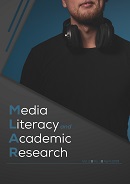Location-Based Games as a Method of Teaching Seniors in the Field of Digital Technologies
Location-Based Games as a Method of Teaching Seniors in the Field of Digital Technologies
Author(s): Magdaléna ŠvecováSubject(s): Philosophy, Social Sciences, Education, Psychology, Communication studies, Educational Psychology
Published by: Univerzita sv. Cyrila a Metoda v Trnave, Fakulta masmediálnej komunikácie
Keywords: Digital gap; Digital immigrants; Edutainment; Linear teaching; Location-based games; Smartphones;
Summary/Abstract: Research on the education of seniors is a continually developing area of educational studies.However, current researchers emphasize the need for further exploration, due to ongoing social and civilizational changes, as well as the fast digitization of society to which seniors are not able accommodate very quickly. The author of this study will present results of research experiment named LoGaSET which is based on comparing two teaching and learning concepts:edutainment and the classic linear way of education. The concept of edutainment (includingthe use of location-based games as an educational method) is gaining popularity as a formof teaching. However, there are only a few studies verifying the effectiveness of its use. What is especially important, is that location-based games as an educational method are aimed particularly at young learners. Furthermore, it is not used in teaching ICT. That is the reason why the fundamental idea of the LoGaSET project was the creation of a course for seniors in the field of smartphones. This course was conducted using two methods: the class-lesson method and the location-based game method. After creating both didactic models and scenarios and testing them, researchers conducted educational courses for seniors at the local level.As a result, we can now assume some main conclusions regarding education of seniors in the field of smartphones based on the quantitative and qualitative data we observed during experimental teaching.
Journal: Media Literacy and Academic Research
- Issue Year: 2/2019
- Issue No: 1
- Page Range: 61-71
- Page Count: 11
- Language: English

